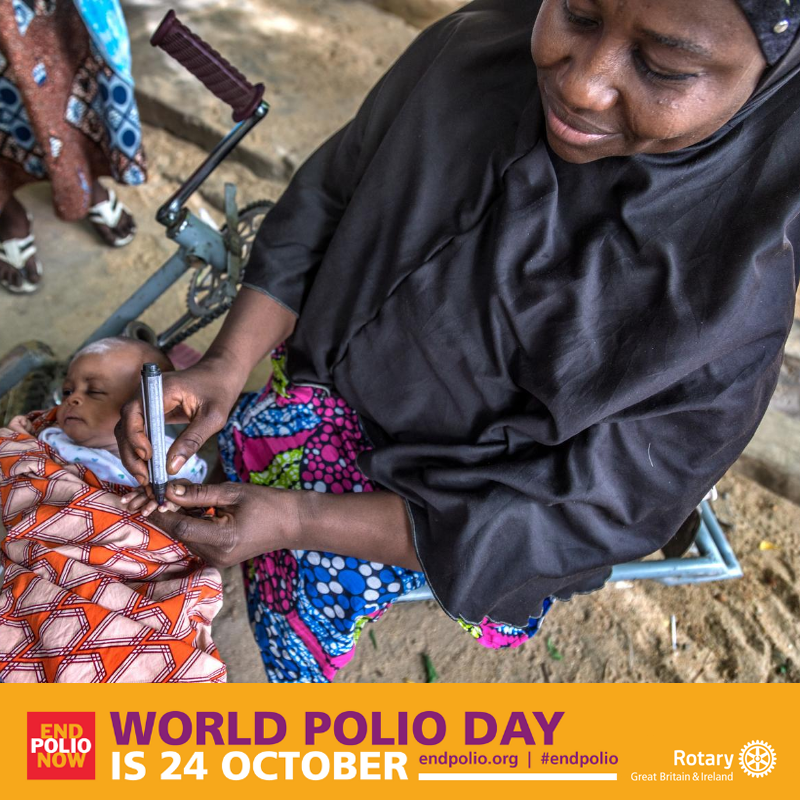Polio is a crippling and potentially fatal infectious disease which Rotary has been working hard to eradicate globally since 1985. It affects mainly children under 5 and costs just 20p per vaccine. Recently, Africa has been declared polio-free which is a huge win for the region. Polio could be just the second human disease to be eradicated worldwide in history.
Each year, World Polio Day is on 24th October and over many years the Rotary Club of Clifton has distributed Crocus corms to local schools and organisations such as Southmead Hospital, Arnos Vale Cemetery and Christ Church to help raise awareness.
Background
For over 30 years, Rotary and its members have been committed to the eradication of polio across the world. The amount of polio-endemic countries has dropped from 125 to just two, with over 2.5 billion children receiving vaccinations thanks to the help of Rotary, among other organisations such as the Bill and Melinda Gates Foundation.
With eradication now closer than ever, Purple4Polio, Rotary International in Great Britain and Ireland’s Royal Horticultural Society latest campaign, is designed to unite communities to engage in activities as part of the final push to rid the world of polio for good.
The purple crocus is a symbol of Rotary’s worldwide polio campaign, with its colour representing the purple dye used to mark the finger of a child who has been immunised.
Crocus Planting
As part of this campaign, The Rotary Club of Clifton is offering schools and other local organisations the opportunity to plant purple crocuses in their grounds. The Rotary Club of Clifton provides the crocus corms (up to a maximum of 250) for the pupils or staff to plant, and offers advice on planting. A sign is then placed near the crocuses to help raise awareness of the campaign.
Crocuses are planted between September and the end of November and flower in February giving the pupils, staff, parents and public a colourful reminder of the need to eradicate polio once and for all.
So far in 2020, crocuses have been delivered for planting at Redland Green School, Elmlea Junior School, St Katherine’s School, Oasis Longcross Junior School, Bristol Free School, Westbury Park Primary School, St Mary Redcliffe School, St Bernardette’s School, Kings Weston House, Coombe Dingle Sports Centre and Southmead Hospital.
Although many countries are no longer polio-endemic, they are still at risk of the disease returning, making continued immunisation programmes vitally important. Failure to eradicate polio could result in as many as 200,000 new cases worldwide every year within a decade. That’s why Rotarians, governments, nongovernmental organisations and the public are working together to raise the additional $1.5 billion needed to eradicate polio for good. Together we can beat polio.
Globally, more than 2.5 billion children have been protected against the disease, which have reduced the number of cases by 99.9% from around 1,000 cases per day in 125 countries.
Club President, Bruce Simmonds, said, “This is a terrific landmark in the world’s battle to eradicate polio. Although it has been many years since polio has been present in the UK and Ireland, we are proud to have contributed to the global efforts to eliminate the disease for good.”
“We remain committed to making the final, challenging steps towards making a polio free world a reality.”
“If we don’t finish the job, it is estimated that, within 10 years, as many as 200,000 children annually all over the world could succumb to polio, including here in the UK. The virus can literally be a plane ride away so vaccination is so important.”
Despite this significant milestone being reached, the job to fully rid the world of polio goes on, as the virus continues to circulate in parts of Pakistan and Afghanistan.
In order to sustain this progress, vaccination programmes must continue to protect every last child and strengthen routine immunisation to keep immunity levels high, so the virus does not return to Africa or other parts of the world, including the UK.
Rotary has directly contributed more than US$2 billion to ending polio since 1985.
To get involved in Rotary and make a difference in your community and around the world, contact us.
